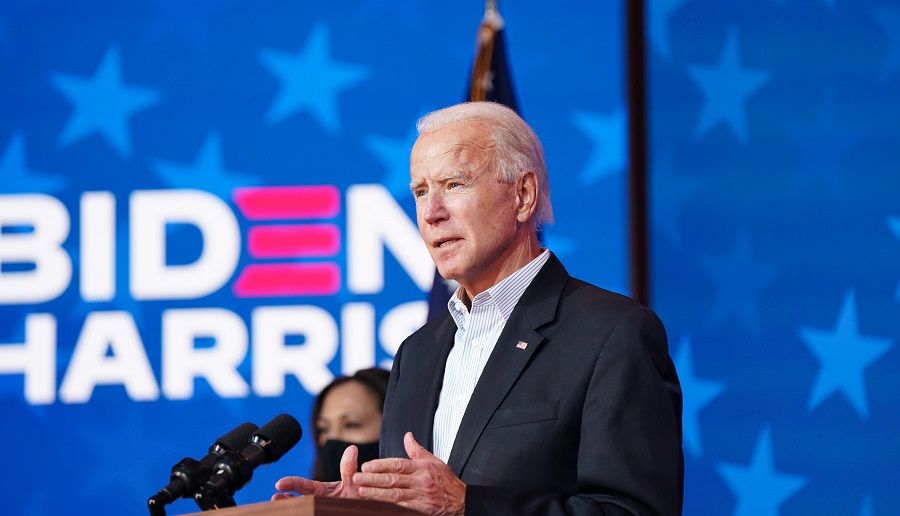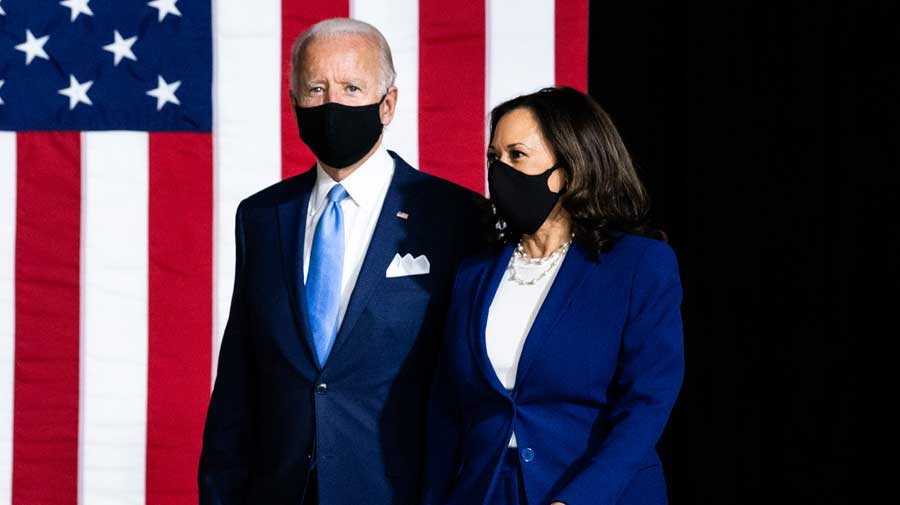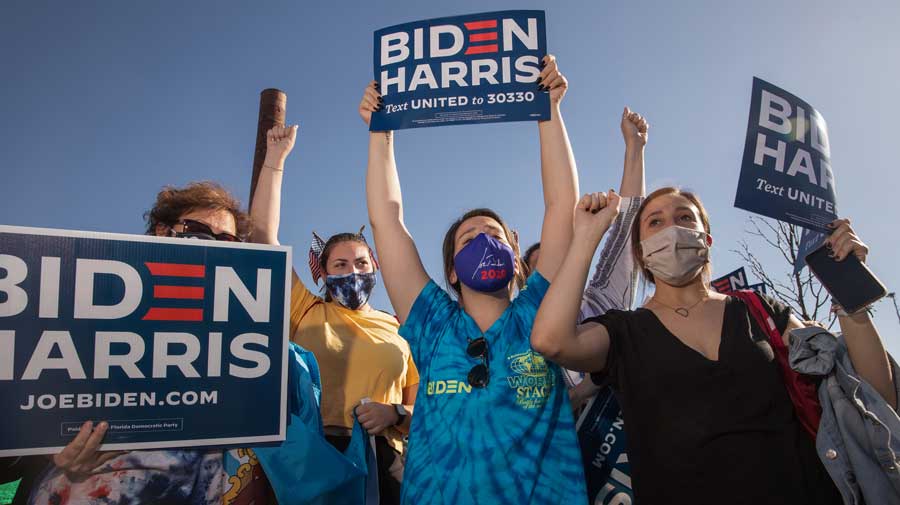How do you get over the parroting of the slogan “Ab ki baar Trump sarkar” a little over a year ago?
Answer: Ask the BJP IT Cell to dig out a 2014 clip of Joe Biden praising Narendra Modi after hosting a lunch during the Prime Minister’s US visit.
As Biden stands poised to become America’s 46th President, early signs of a recalibration in the Modi government’s ecosystem to manage the optics became visible on Saturday.
Amit Malviya, in charge of the BJP’s IT cell, sought to set the tone by pulling out the Biden clip from September 2014.
“The Left cabal in India that is hallucinating of a blow to Modi if Biden was to be elected the President of the United States should listen to what he had to say... (smiley emoji) It may upset them no end,” Amit Malviya tweeted.
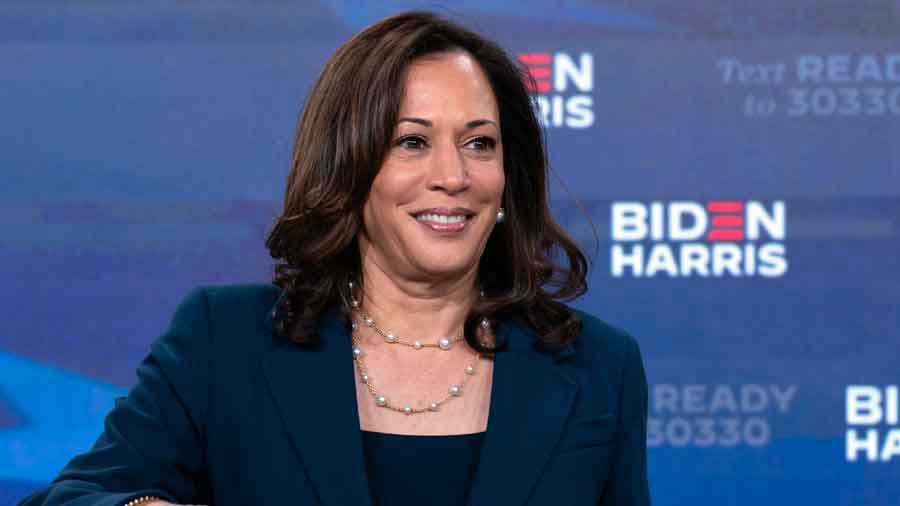
Kamala Harris File picture
No one expects a drastic change in the trajectory of the bilateral relationship, bolstered by bipartisan support in Washington and favoured by exigency — given America’s power competition with China.
However, with Biden expected to reclaim America’s position as moral policeman of the world, the Modi government faces the possibility of losing the level of comfort it had with the Trump administration on human rights issues.
But first things first. Ever since Biden took the pole position, video clips of a speech Modi made in Houston in September 2019 have bounced back on social media.
It shows Prime Minister Modi speaking with Trump standing nearby on the stage. “Friends, we in India have connected well with President Trump, the words of candidate Trump, ab ki baar, Trump sarkar,” Modi is heard saying.
The Opposition in India had accused the government of violating a time-honoured foreign policy principle of not interfering in another country’s domestic politics. Foreign minister S. Jaishankar had in reply invoked the technicality that Modi was simply quoting what Trump had said during his 2016 campaign when he had reworked Modi’s 2014 Lok Sabha election slogan to woo the Indian diaspora.
But that technicality was lost on Trump's campaign team, which saw the entire event as an endorsement by Modi of the President.
“President @realDonaldTrump received the endorsement of Indian Prime Minister Narendra Modi as they shared a stage in Houston, walking hand in hand... to address more than 50,000 Indian Americans!!” tweeted Kayleigh McEnany, national press secretary for the President's 2020 campaign, after the Howdy Modi event. McEnany went on to become the White House press secretary.
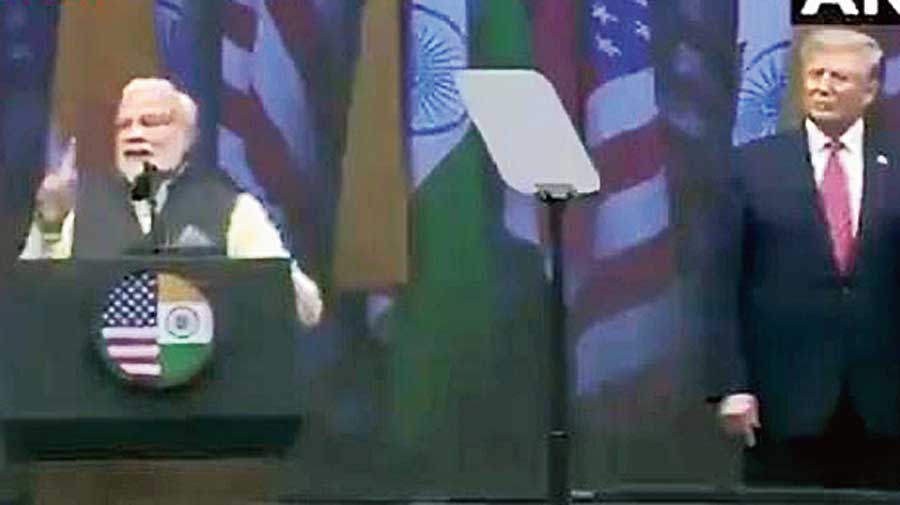
Modi and Trump at the Houston rally in September 2019. Sourced by The Telegraph
Team Trump, “the official Twitter for the Trump campaign”, had said: “President @realDonaldTrump received the endorsement of Indian Prime Minister Modi!”
It posted a Bloomberg article titled “India’s PM endorses Trump to Indian Americans” with a picture of the Prime Minister and the President in a bear hug.
Despite this, the Modi government went ahead and hosted a similar event in Ahmedabad for Trump on his maiden visit to India in February this year. Although there was no repeat of the slogan, the trappings of the event were straight out of a Trump campaign rally, down to the songs that were played.
Again, Trump’s team portrayed this as an endorsement, as was evident from the campaign video that was officially launched in August in the US to reach out to the Indian diaspora.
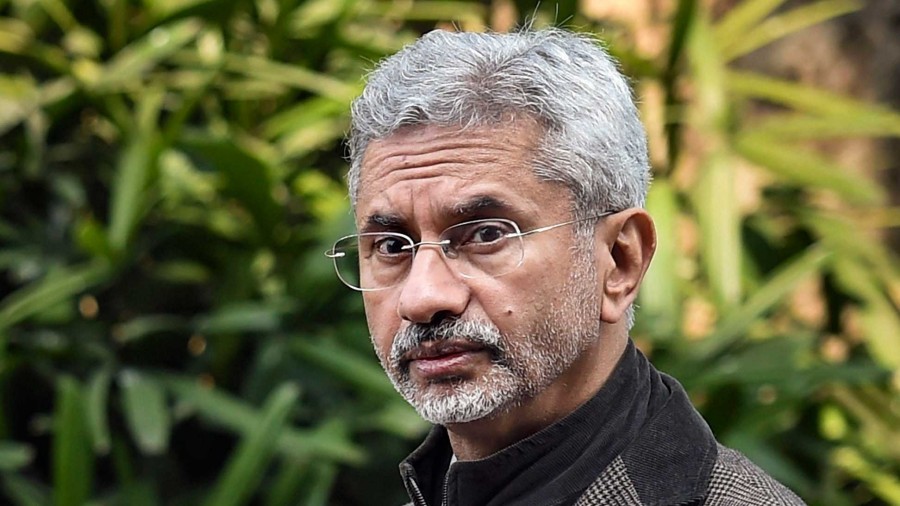
S Jaishankar File picture
On human rights, Trump seldom gave India any grief for moving away from the democratic values that both countries claim to hold dear, whether on the prolonged Kashmir lockdown or the contentious citizenship law.
Although Republicans in the US Congress have voiced concern on both counts, Washington under Trump practically gave the Modi government a free pass.
Things could be different under Biden, going by what is stated on his campaign website as the agenda for Muslim American communities.
“In Kashmir, the Indian government should take all necessary steps to restore rights for all the people of Kashmir. Restrictions on dissent, such as preventing peaceful protests or shutting or slowing down the Internet, weaken democracy,” it goes.
“Joe Biden has been disappointed by the measures that the government of India has taken with the implementation and aftermath of the National Register of Citizens in Assam and the passage of the Citizenship Amendment Act into law. These measures are inconsistent with the country’s long tradition of secularism and with sustaining a multi-ethnic and multi-religious democracy.”
Biden’s running mate Kamala Harris too has been vocal on Kashmir, which explains the less than lukewarm reaction across the BJP ecosystem to her selection for the position in August despite her Indian origins.
Without going into the dilution of Article 370, she had spoken up for Kashmiris in September 2019. “We have to remind the Kashmiris that they are not alone in the world. We are all watching. There is a need to intervene if the situation demands,” she was quoted as saying by US-based media.
Two other contenders for the Democratic presidential ticket — Bernie Sanders and Elizabeth Warren — too had raised the plight of Kashmiris during the contest for the nomination, which suggests this is an issue the incoming administration is unlikely to ignore.
It also raises questions about the wisdom of not just investing so much in Trump — that too at a personal level by Modi by hosting two Make-America-Great-Again-style rallies for him when the US was in its presidential election cycle — but also of foreign minister S. Jaishankar trying to brazen it out in Washington.
In December, Jaishankar had cancelled a meeting with a US Congressional delegation after it refused to exclude Indian American Congresswoman Pramila Jayapal, who has been particularly vociferous against the Modi government taking India away from its constitutional path and foundational values.
Jayapal had also moved a bipartisan resolution in the House of Representatives criticising the Kashmir clampdown. Jaishankar’s act secured the resolution 10 more co-sponsors — all Democrats.
All this prompted many to question the wisdom of antagonising America’s Opposition party in an election year.
Jayapal has just been re-elected to the House.
Harris had not minced words while criticising Jaishankar’s move. “It’s wrong for any foreign government to tell Congress what members are allowed in meetings on Capitol Hill. I stand with @RepJayapal and I’m glad her colleagues in the House did too,” she had tweeted.
Democrats are expected to be less strident in office, but the party tends to lean more towards liberalism than the conservative Republicans.
Modi, however, had also tried to build camaraderie with the 44th President, Barack Obama, and can be expected to do so with Biden.

